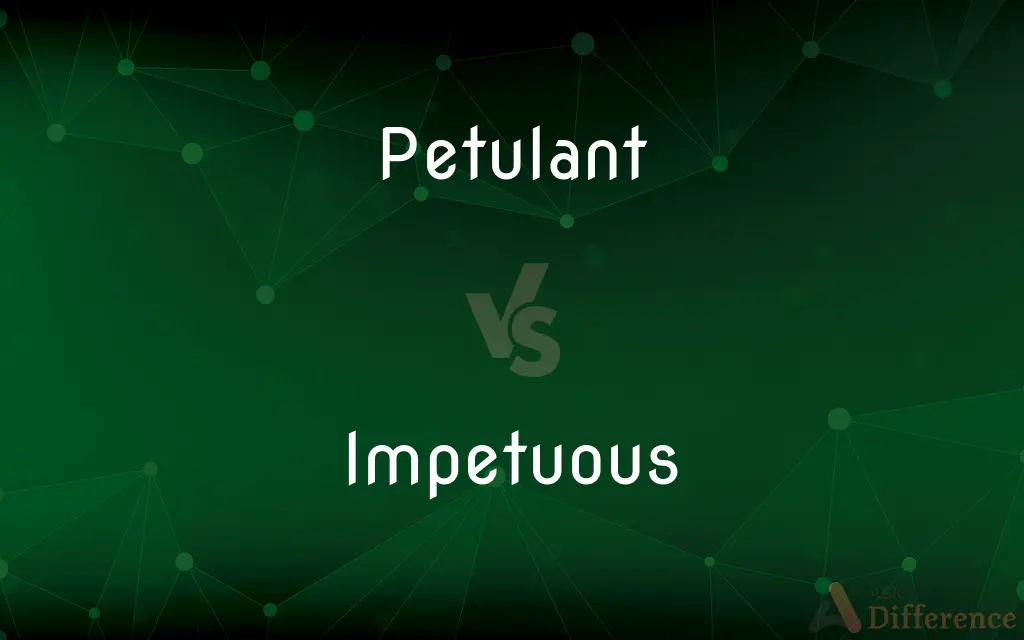Petulant vs. Impetuous — What's the Difference?
Edited by Tayyaba Rehman — By Fiza Rafique — Updated on May 2, 2024
Petulant describes someone who is irritable or childish in their annoyance, while impetuous refers to acting hastily without thought, often impulsively.

Difference Between Petulant and Impetuous
Table of Contents
ADVERTISEMENT
Key Differences
Petulant behavior is characterized by sulky or bad-tempered reactions, often to minor inconveniences or irritations. Whereas impetuous actions are driven by sudden desires or emotions, without consideration of the consequences.
Petulant individuals may display a persistent pattern of irritability and quickness to take offense. On the other hand, impetuous people are prone to making snap decisions and taking bold actions that reflect little planning or forethought.
The mood of a petulant person can be seen as consistently irritable over trivial matters, while an impetuous individual might exhibit bursts of enthusiasm or anger.
While petulance is mainly a behavioral trait, reflecting an attitude or temperament, impetuosity is more about the manner of conducting actions often quick and reckless.
Petulance often affects interpersonal relationships through minor but frequent disturbances, whereas impetuous behavior can lead to significant, sometimes life-altering decisions due to its rash nature.
ADVERTISEMENT
Comparison Chart
Definition
Childishly sulky or bad-tempered
Acting quickly without thought
Behavior Pattern
Persistent irritability
Sudden and spontaneous actions
Typical Context
Minor annoyances
Significant decisions or actions
Impact on Actions
Limited to mood and responses
Leads to decisive, often risky actions
Consequence
Strains in personal interactions
Potential for major repercussions
Compare with Definitions
Petulant
Characterized by childish sulkiness or bad temper.
Her petulant demeanor made small disagreements unpleasant.
Impetuous
Can reflect enthusiasm or passion, but often lacks prudence.
His impetuous nature made him a fearless, yet unpredictable leader.
Petulant
Showing sudden, impatient irritation over trivial issues.
He responded with a petulant shrug when asked to redo his work.
Impetuous
Moving forcefully or with sudden energy.
She made an impetuous dash towards the door to greet her friend.
Petulant
Can lead to petty or trivial disputes in relationships.
Their conversation ended in a petulant argument over something minor.
Impetuous
Prone to act under the sway of emotional or volatile urges.
Impetuous outbursts characterized his early years.
Petulant
Often resulting from minor irritations or disappointments.
She was petulant after being denied a break.
Impetuous
Acting or done quickly and without thought or care.
His impetuous decision to invest caused unexpected losses.
Petulant
Typically expressed through moody and sulky behavior.
His petulant reply to the constructive criticism was unexpected.
Impetuous
Often associated with rash or sudden actions that may have risky outcomes.
The impetuous leap into the unknown venture was a bold move.
Petulant
Unreasonably irritable or ill-tempered; peevish.
Impetuous
Acting or done quickly and without thought or care
She might live to rue this impetuous decision
Petulant
Contemptuous in speech or behavior.
Impetuous
Acting or done quickly with little or inadequate thought.
Petulant
Childishly irritable.
Lack of sleep is causing Dave's recent petulant behavior.
Impetuous
Having or marked by violent force
Impetuous, heaving waves.
Petulant
(obsolete) Forward; pert; insolent; wanton.
Impetuous
Making arbitrary decisions, especially in an impulsive and forceful manner.
Petulant
Forward; pert; insolent; wanton.
Impetuous
Characterized by sudden violence or vehemence.
Petulant
Capriciously fretful; characterized by ill-natured freakishness; irritable.
Impetuous
Rushing with force and violence; moving with impetus; furious; forcible; violent; as, an impetuous wind; an impetuous torrent.
Went pouring forward with impetuous speed.
Petulant
Easily irritated or annoyed;
An incorrigibly fractious young man
Not the least nettlesome of his countrymen
Impetuous
Vehement in feeling; hasty; passionate; violent; as, a man of impetuous temper.
The people, on their holidays,Impetuous, insolent, unquenchable.
Impetuous
Characterized by undue haste and lack of thought or deliberation;
A hotheaded decision
Liable to such impulsive acts as hugging strangers
An impetuous display of spending and gambling
Madcap escapades
Impetuous
Marked by violent force;
Impetuous heaving waves
Common Curiosities
What might cause a person to be petulant?
It often stems from an inability to manage disappointment or minor irritations effectively.
How can impetuous actions impact one’s life?
They can lead to significant consequences due to the lack of forethought and sudden execution.
What are typical outcomes of petulant behavior?
It typically leads to minor but frequent interpersonal issues.
Can someone be both petulant and impetuous?
Yes, an individual can exhibit both traits, but they manifest in different aspects of behavior.
Is impetuosity always negative?
While often risky, impetuosity can also result in spontaneous and genuine actions that might have positive outcomes.
How does impetuosity affect relationships?
It can strain relationships due to unpredictability and rash decisions.
Can children be described as petulant?
Yes, children can often display petulant behaviors, particularly when tired or frustrated.
What strategies help in dealing with petulant behavior?
Patience, clear communication, and setting boundaries can be effective.
What is the main difference between petulant and impetuous?
Petulant refers to being irritable over small things, while impetuous is about acting hastily without thinking.
How can one manage a petulant individual in a team?
It's important to address issues calmly and set clear expectations to mitigate sulky or irritable behaviors.
What are examples of impetuous behaviors in the workplace?
Making quick decisions without consulting others or considering all factors.
Share Your Discovery

Previous Comparison
Massage vs. Message
Next Comparison
Many vs. MuchAuthor Spotlight
Written by
Fiza RafiqueFiza Rafique is a skilled content writer at AskDifference.com, where she meticulously refines and enhances written pieces. Drawing from her vast editorial expertise, Fiza ensures clarity, accuracy, and precision in every article. Passionate about language, she continually seeks to elevate the quality of content for readers worldwide.
Edited by
Tayyaba RehmanTayyaba Rehman is a distinguished writer, currently serving as a primary contributor to askdifference.com. As a researcher in semantics and etymology, Tayyaba's passion for the complexity of languages and their distinctions has found a perfect home on the platform. Tayyaba delves into the intricacies of language, distinguishing between commonly confused words and phrases, thereby providing clarity for readers worldwide.
















































